Bourgogne-Franche-Comté is a beautiful and possibly slightly lesser-known area of France to international buyers. Located in the east of the country, the region was created by the merging of Burgundy (Bourgogne) and Franche-Comté in 2016.
This vast area comprises eight departments, the largest of which is Dijon which also serves as its prefecture. Interestingly, the regional council sits in Besancon, making this region one of only two where the prefect is not in the same city as the regional council. Normandy is the other exception.
The eight departments are Côte-d’Or, Doubs, Haute-Saône, Jura, Nièvre, Saône-et-Loire, the Territoire of Belfort and Yonne.
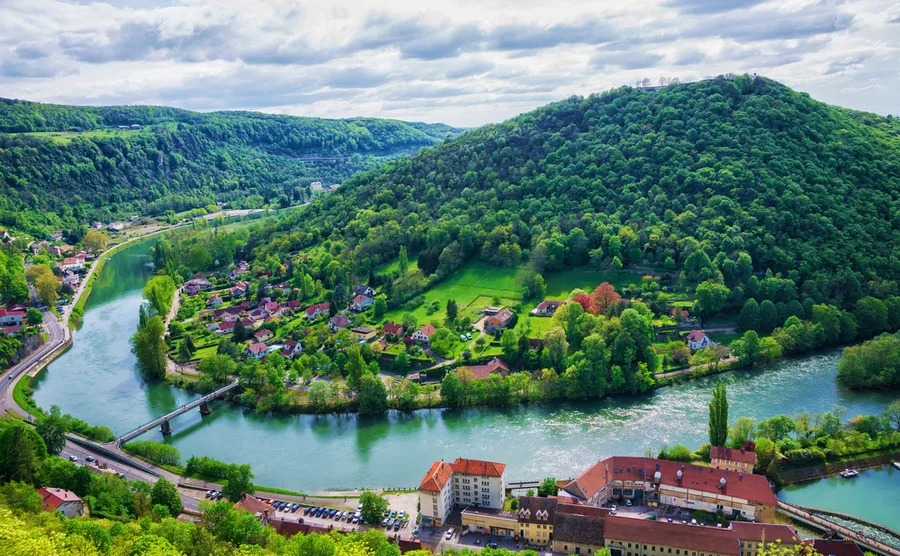
Besancon of Bourgogne Franche Comte
Find homes in France via our property portal.
What is the region best known for?
Burgundy is known for its excellent wines of course but also is of great historical and artistic interest as well as its Romanesque heritage.
If you are a gastronome, you will not be disappointed here as there are some 30 Michelin-starred restaurants in the area as well as over 30 great wine vintages.
Franche-Comté is best known for its nature. This whole region is one of rolling hills, huge open green spaces, mountains, lakes and forests. Taken together, this region has a huge amount to offer. As well as natural beauty, there are some outstanding towns and villages and affordable property prices too.
The best places to visit in Bourgogne-Franche-Comté
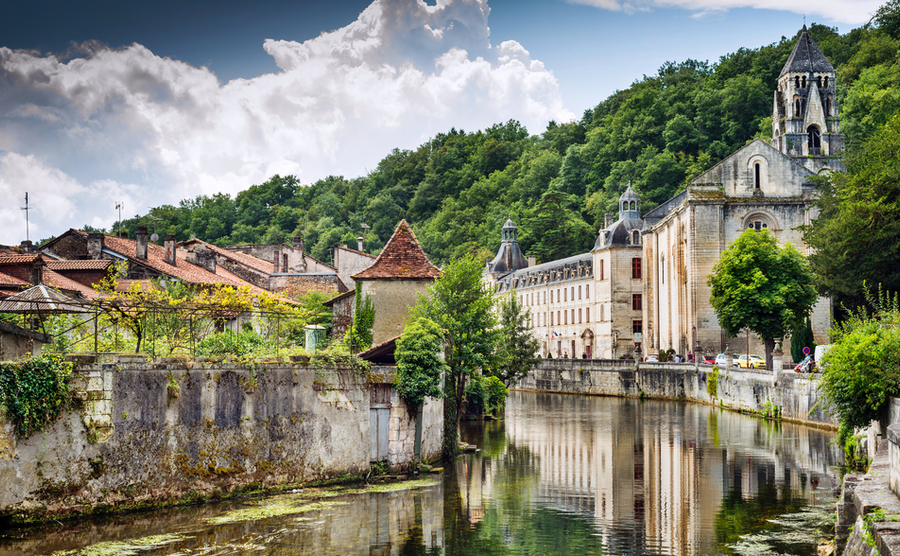
Abbey of Brantome
Abbeys in Burgundy
There are several medieval abbeys in the region, three in particular are well worth a visit:
- The Abbey of Cluny in the Saone-et-Loire department is the oldest abbey dating back to 910.
- The Abbey of Notre Dame de Citeaux in the Cote d’Or department was founded in the 11th century. Its gothic style can be seen in many monasteries throughout the area.
- The Abbey of Fontenay in the Cote d’Or was founded in the 12th century and is a fine example of a Cistercian abbey.
The Citadel of Besancon
This incredible fortress was built in the 17th century by Vauban and is noted as one of his masterpieces. It was listed in 2008 as a UNESCO World Heritage Site. Occupying over 11 hectares, the Citadel itself looks down on the beautiful ancient town of Besancon and its surrounding area. Besancon itself is known as the capital of watchmaking in France. It has also become an important centre for technological and engineering companies. It has often been labelled as “the greenest city in France” and is proud of its historical heritage and fortifications.
The canals
Burgundy is known for its waterways: over 1000 km of them were built in the 18th and 19th centuries to transport all manner of goods. The Nivernais, Centre, Bourgogne and Seille make up the Burgundy canals and nowadays are used simply for leisure.
The best towns and villages in Bourgogne-Franche-Comté
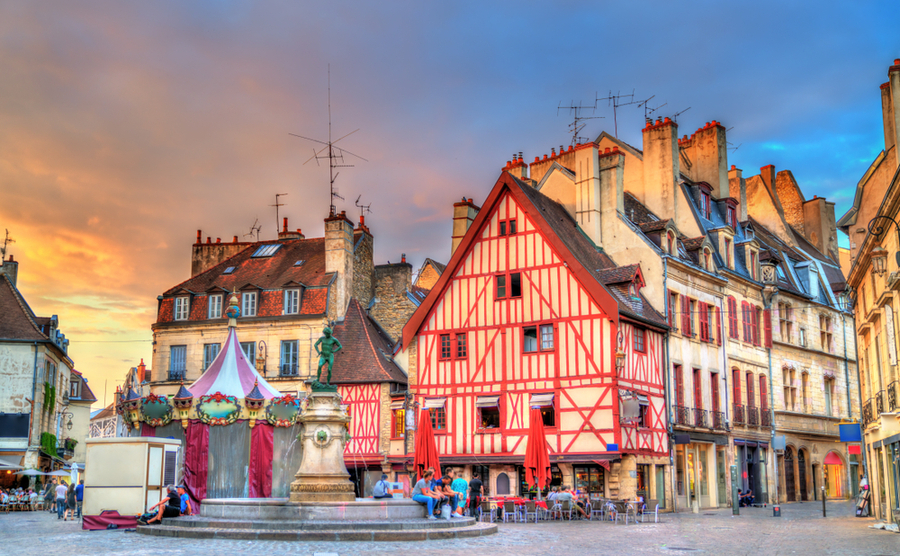
Dijon
Dijon
Dijon has a magnificent historic centre dotted with half-timber ancient houses, some incredible churches as well as the Fine Arts Museum which is one of the largest in Europe. It also boasts plenty of greenery with parks and gardens surrounding the city. Interestingly, as soon as you arrive here you can just about smell the mustard which is still made here! Well worth a pit stop.
Auxerre
Auxerre lies at the top end of the meandering Nivernais Canal. It too has a remarkable centre, well celebrated by the sound and light show every summer evening “Les Grandes Heures d’Auxerre”. Take a walk through the town and along the bridge over the river Yonne where at night the Cathedral of Saint Etienne and the Abbey are stunningly lit up.
Mâcon
Mâcon is probably best known for its excellent wines. It also has a beautiful port and a pretty town centre with little alleyways, well worth exploring. This is a town for foodies since it is famous also for its gastronomy and each spring there is a wine contest called “Grands Vins de France” held here.
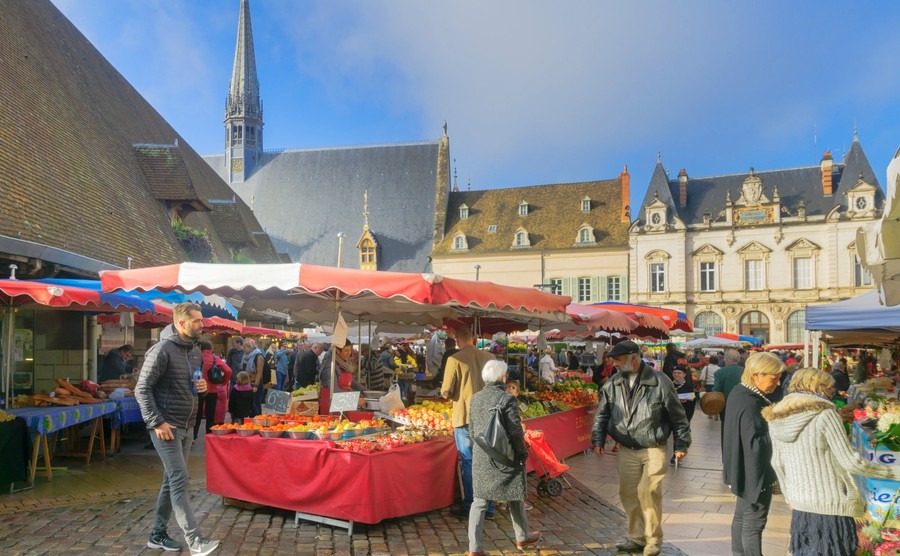
A typical market scene in Beaune, Bourgogne
Buxy and Vézelay
Buxy is a wine-growing village set on the Cote Chalonnaise. The village consists of some beautifully colourful houses and monuments plus there is a wine grower’s museum explaining how wine has been made across the centuries.
Vézelay is a charming village is on the World Heritage Site list by UNESCO. It is tiny with only around 500 residents but is still known as a stopping-off point for pilgrims who would worship here before setting off on their pilgrimage.
Flavigny sur Ozerain
This village, on the official list of “The Most Beautiful Villages in France” dates back to medieval times and still has several fortifications from those days. Perched on the top of a small hill, exploring its little winding streets and ancient houses is an absolute delight. The village rose to fame in 2001 when it was used as the location for the film “Chocolat” starring Johnny Depp and Juliette Binoche.
Dole and Lons le Saunier
Dole and Lons le Saunier are lovely towns in the Jura department of the Franche-Comté region. The Jura is a department of forests, rivers and mountains close to the Swiss border and has some fabulous sleepy little villages such as Clairvaux les Lacs and Baume les Messieurs nestled in the countryside. Dole has an impressive church and Lons le Saunier is known for its pipe makers!
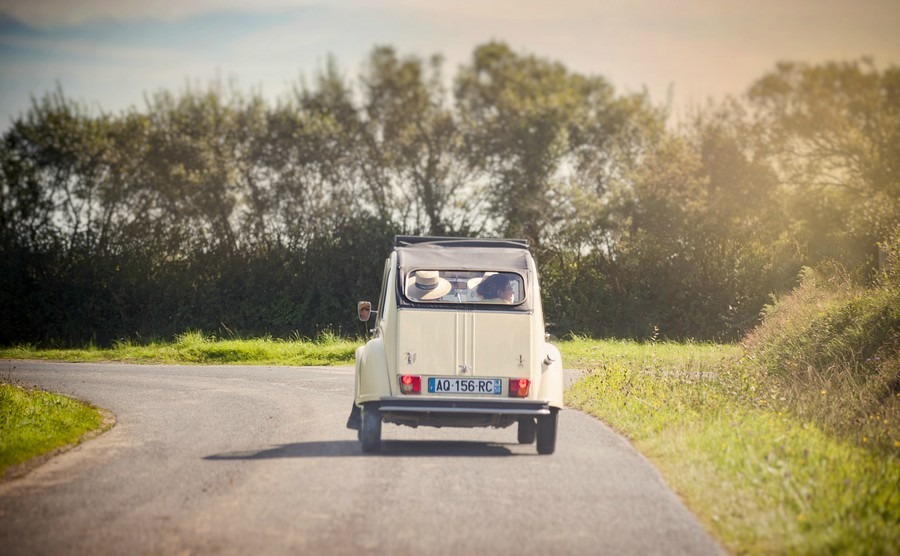
You can certainly drive to Bourgogne Franche-Comte from the UK
Getting to Bourgogne-Franche-Comté from the UK
Bourgogne-Franche-Comté is easy to get to from the UK. By air, your best bet is to fly to Paris or Lyon and then take the TGV train from there. If you prefer train travel, take Eurostar to Paris and then hop on the TGV to Dijon. Alternatively, you can drive all the way there. From Calais, it is around a five-and-a-half-hour drive to Dijon.
Property prices in Bourgogne-Franche-Comté
There is a wide variety of property for sale in this region, from ancient farmhouses to modern apartments in the major towns. The area is not as popular amongst foreign buyers as the better-known regions of Aquitaine and Provence. Prices are reasonable and far cheaper in towns such as Dijon and Besancon than say, Lyon. A budget of around €250,000 will buy you a lovely 3-4 bedroomed house in the area but if you are looking for a little pied a terre, a budget of less than €100,000 will get you an apartment or small house.
If you are unsure about where to either visit or buy property in France and are up for an adventure, this lovely, sometimes forgotten region, may be well worth a shot.
You might also like:










